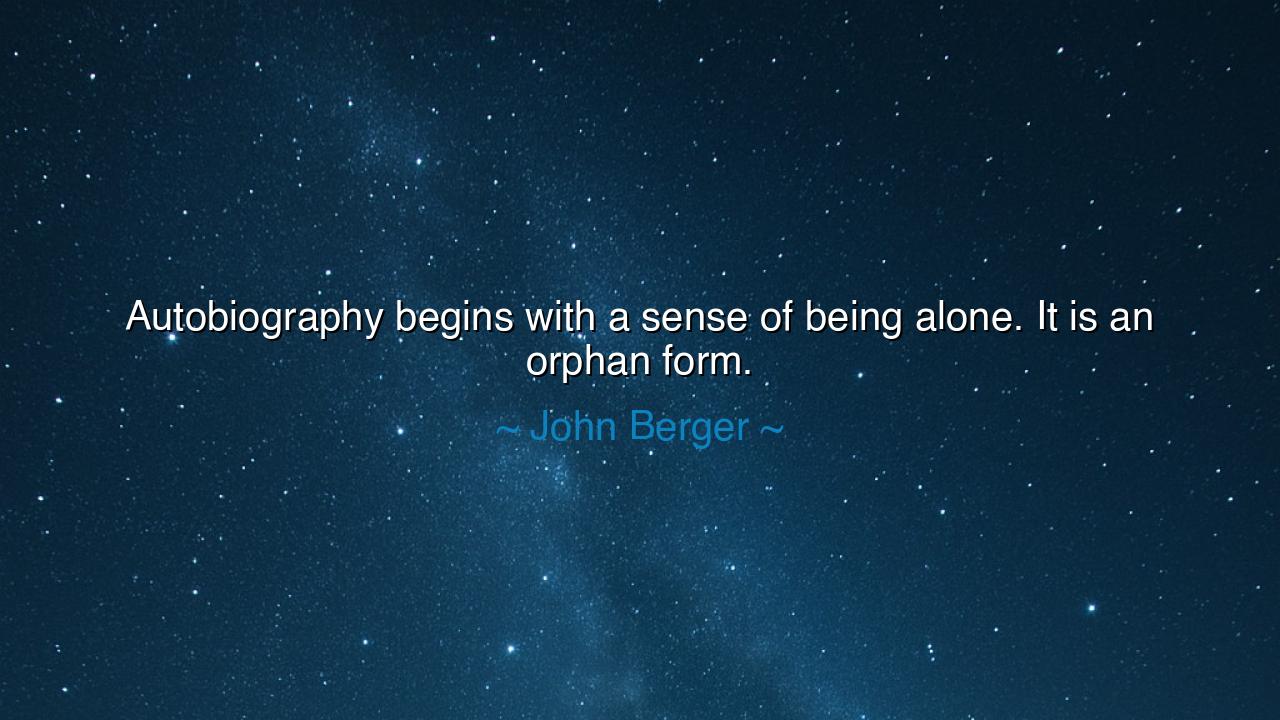
Autobiography begins with a sense of being alone. It is an orphan






When John Berger wrote, “Autobiography begins with a sense of being alone. It is an orphan form,” he was not speaking merely of literature, but of the condition of the soul. In these words, he revealed a truth that echoes through time: that the act of telling one’s own story is born not from comfort or belonging, but from isolation — from that deep, haunting awareness of being singular in a vast and indifferent world. An autobiography, he tells us, is an orphan form because it has no home, no lineage beyond the self. It begins when one can no longer find their reflection in others, when the noise of the world fades, and one must turn inward to listen to their own heartbeat.
Berger, the philosopher, critic, and storyteller, lived his life observing the fractures of human existence — exile, labor, memory, and the ways we seek meaning in art. His quote arises from this lifelong gaze into the solitude of being. To write one’s life, he suggests, is to stand apart — to step outside the collective story told by family, nation, or faith, and to confront one’s aloneness. It is an act both courageous and sorrowful: courageous, because it demands truth stripped of illusion; sorrowful, because it reminds us that the telling of one’s story can never bring back the warmth of belonging. The autobiographer, then, is both creator and exile — shaping from loneliness a world of words that no longer has parents but must be its own inheritance.
Throughout history, those who have written the truest autobiographies have done so from this same orphaned solitude. Consider St. Augustine, who in his Confessions bared his soul before God and man. His was no chronicle of events but a searching — a dialogue between his lonely heart and the Eternal. Augustine was not merely recalling his life; he was seeking a home for his soul, which could no longer rest in the fleeting pleasures or philosophies of his time. Like Berger’s orphan, he wrote because there was nowhere else to go — no fatherly voice to explain the meaning of his suffering, no community to speak for his heart. In his isolation, he became both the seeker and the found, the writer and the written.
The same can be said of Jean-Jacques Rousseau, whose Confessions centuries later would echo Augustine’s solitude, but with a modern cry — the cry of a man cast out by society, misunderstood, mistrusted, and yet unable to silence his need to define himself. When Rousseau wrote, “I am made unlike anyone I have ever met,” he was declaring what Berger would later articulate: that autobiography begins in the recognition of separation. It is the voice of the self that stands apart, attempting to weave its own lineage out of memory and meaning, for no one else will do it. The autobiographer writes as one who has lost the mother of belonging, and so must give birth to himself.
This is why Berger calls autobiography an “orphan form.” It is not rooted in the lineage of tradition or the safety of collective myth. It is a wandering form, one that carries the ache of displacement — the same ache found in the exile’s poem, the artist’s confession, the refugee’s story. In the orphan’s solitude, creativity awakens. For when one can no longer depend on the stories of others, one begins to create a new story — one that springs entirely from the depths of the self. It is both an act of rebellion and of healing: rebellion against the world that forgot you, and healing through the rediscovery of your own voice.
And yet, there is a strange beauty in this loneliness. For to be alone, truly alone, is also to be free — free to look inward without disguise, free to name the world anew. Many who have written from this place of solitude have transformed their orphanhood into something luminous. Frida Kahlo, through her self-portraits, painted her pain, her body, and her spirit as one — each canvas an autobiography in color, born of both suffering and strength. In her isolation, she created intimacy with all who would later gaze upon her work. This, too, is the paradox of Berger’s wisdom: though autobiography begins in loneliness, it ends by bridging that loneliness, drawing others close through the shared recognition of what it means to be human.
The lesson, then, is this: do not fear the solitude that calls you inward. When you feel estranged — from the world, from others, even from yourself — know that this is where truth begins. Speak to that solitude, write from it, create from it. For it is there that your authentic voice is born — a voice that owes nothing to imitation or approval. Learn to befriend your aloneness, to honor it as the soil in which your story grows. The child who has no mother finds wisdom in the silence; the soul that has no home finds freedom in the act of creation.
So remember the teaching of John Berger: “Autobiography begins with a sense of being alone. It is an orphan form.” Do not wait for the world to tell your story; the world does not know your name as you do. Begin it yourself, in solitude, and let your words be the home you build from exile. For every person who dares to write or live from that sacred aloneness becomes, in time, not an orphan — but a maker of lineage, a founder of truth, a witness to the divine strength that lives in every human heart.






AAdministratorAdministrator
Welcome, honored guests. Please leave a comment, we will respond soon